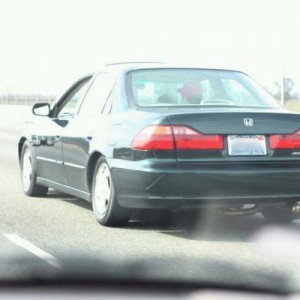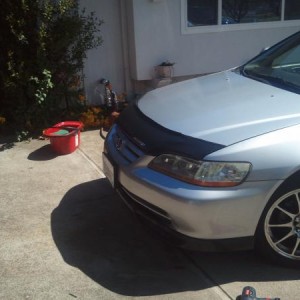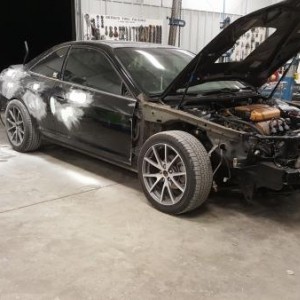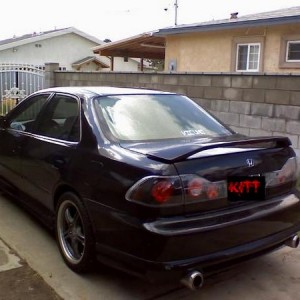Re: JDMCG3's N/A H22 Build (Last Update: 12/20/2011)
some info i found over on attackforums.com
Increasing the stroke:
The stock stroke of an H22 is 90.7mm, and there are several (relatively) inexpensive ways to go about stroking it even further using Honda crankshafts if you're so inclined.
The F & H series blocks are all extremely closely related – so in many instances it's possible to use an F or H series crank in a different block. The only limitations lie in the change in crankshaft mains in 1998 – they went from a 50mm main to a 55mm main. The most common option for an H22 is to use the 95mm crankshaft from the H23 or F22. With the stock bore, this works out to 2,259cc’s of displacement – a 102cc increase (or 2,364cc’s and a 207cc increase if combined w/ an 89mm bore). An even more extreme crankshaft can be found in the F23 engine from some of the more recent Accords – it rings in at a 97mm stroke (2,306cc’s for the stock bore, 2,414cc’s on an 89mm bore).
But however much fun it is to dream about the vast amounts of displacement available via stroke, there are some serious considerations to make beforehand. By changing the stroke, you’re messing with some fairly vital engine geometries – namely bore/stroke & rod/stroke ratios.
Without delving too deeply into the physics of engine geometry, basically the length of an engine’s stroke (and the resultant rod length) is directly proportional to it’s ability to rev. Longer stroke = faster piston speeds. Shorter rod = faster piston acceleration, more side-loading, and less dwell time at TDC. As a result, the engine’s torque curve will want to move lower in the powerband (which can make any kind of aggressive final drive you’d like to use quite frustrating). Because of the increased piston speeds, do NOT expect to be able to rev to the stock redline w/out some seriously strong connecting rods & rod bolts. And even if your bottom end is physically capable of taking the abuse of the forces resultant of uber-high piston speeds, chances aren’t good of you making any power up there to begin with – at least, not without some hardcore headwork & massive camshafts. The longer your stroke gets, the harder it is to fill those cylinders efficiently. The shorter the rods, the more power you'll lose due to friction against the sides of the cylinder walls. At it’s extremes, the pistons will actually begin to move as fast (or faster) than the combustion’s flame front. There’s obviously not much power to be found in that scenario.
Another concern is that on the 95 & 97mm crankshafts, less care is taken from the factory in getting them balanced for higher rpm operation - although they're still very nice forged steel units, they're simply not designed to be spun at the kind of speeds the H22 was. So if you decide to use one of these cranks, some extra work balancing, polishing, and even cryo-treating for more strength would be in order.
One final reliability consideration is the oil squirters . . . The H22 comes stock with oil squirters aimed up at the bottom of the pistons. This helps cool the pistons and ensures proper oiling in the cylinder. However, when the move is made to a larger crankshaft, they may not fit anymore . . . which would hardly be desirable for sustained high-rpm operation.
As far as actual stroker kits that are available for the H22, there's some options available, but only a few of which are at all realistic. Supposedly JUN makes one, but I wouldn't know where to start to find it for sale. And knowing JUN, it's no doubt obscenely expensive. Another option I'm semi-aware of is via Top Fuel. The page is all in Japanese, but it appears to be a kit w/ crank, rods, & pistons, costing 168k yen (~$1,500). This seems to be too affordable to be true, though - and again, I wouldn't begin to know where to purchase it.
Or you could go the Crower route - custom Crower crankshafts start at about $2,600. Pair it up with custom rods & whatever pistons you like, and there's your kit. The last possibility that I know of would be R&D Dyno - they advertise 2.4 liter shortblocks assembled starting at $4,500 - or unassembled kits starting at 3 grand.








